Unit 1 Will people have robots(Period 5)
初二unit1Unit 1 Will people have robots
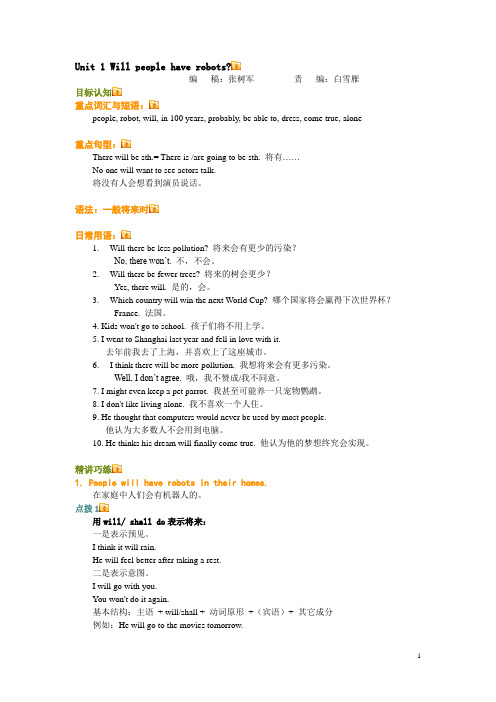
Unit 1 Will people have robots?编稿:张树军责编:白雪雁目标认知重点词汇与短语:people, robot, will, in 100 years, probably, be able to, dress, come true, alone重点句型:There will be sth.= There is /are going to be sth. 将有……No one will want to see actors talk.将没有人会想看到演员说话。
语法:一般将来时日常用语:1. ---Will there be less pollution? 将来会有更少的污染?---No, there won’t. 不,不会。
2. ---Will there be fewer trees? 将来的树会更少?---Yes, there will. 是的,会。
3. ---Which country will win the next World Cup? 哪个国家将会赢得下次世界杯?---France. 法国。
4. Kids won't go to school. 孩子们将不用上学。
5. I went to Shanghai last year and fell in love with it.去年前我去了上海,并喜欢上了这座城市。
6. ---I think there will be more pollution. 我想将来会有更多污染。
---Well, I don’t agree. 哦,我不赞成/我不同意。
7. I might even keep a pet parrot. 我甚至可能养一只宠物鹦鹉。
8. I don't like living alone. 我不喜欢一个人住。
9. He thought that computers would never be used by most people.他认为大多数人不会用到电脑。
山东省枣庄市薛城区奚仲中学人教版(旧)八年级英语下册教案Unit1Willpeoplehaverobots
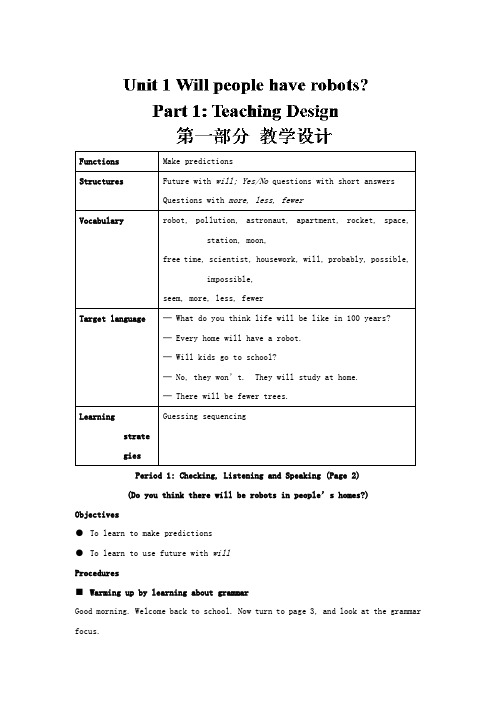
Period 1: Checking, Listening and Speaking (Page 2)(Do you think there will be robots in people’s homes?)Objectives●To learn to make predictions●To learn to use future with willProcedures■Warming up by learning about grammarGood morning. Welcome back to school. Now turn to page 3, and look at the grammar focus.Now give attention to the blackened words. Will is used here to express future event. More examples: I will have English classes this afternoon. He won’t go to school tomorrow.The form of the usage is: will+ verb.Now let’s have a game to make sentences with will to see who will say the most sentences with will.1a Reading and checkingNow let’s go to page 2. There are 6 statements here. Read them and check A if you agree with the prediction. If you disagree with the prediction, check D.1b Listening and circlingListen and circle the predictions you hear in activity 1a.Now go to page 87 to read this conversation. While reading try to find all the sentences with will. And also cut/ the sentence into thought groups, study all theall the linking words and underline all the expressions. That’s grammar study, indeed.Now read the conversation again to turn it into a text.1c Pairing and speakingDo you predict? Now in pairs ask and answer predicting about the future using will.Period 2: Listening and Speaking (Page 3)(There will be more people.)Objectives●To learn to use Yes/No questions with short answers●To learn to use questions with more, less, fewerProcedures■Warming up by talking about robot warsHello, everyone! Nice to see you back at school after the winter holidays. How did you spend your Spring Festival?Now I am going to show you a film called The Story of Robot Wars. What is a robot? Yes, it is 机器人. The story goes like this:All the robots at the governmental institute of robots were shut down for the night, Suddenly in a flash of light they all got beamed to another planet! And then they all automatically turned on they saw that they were in a giant arena. Suddenly a monitor appeared, and on it a giant robot it said "let me explain, I am the champion robot, and I need entertainment, my newest entertainment is the "Robot Wars". It’s where you robots fight each other with missiles, lasers etc. Now eventually you will get to the point where there will other robots from other institutes for you to fight, and eventually one of you will fight me, now when you score a point by hitting your opponent you get a weapon" and with that they all got beamed to separate arenas and so the fight for freedom began.2a Listening and circlingNow we are going to listen and circle the words we hear.2b Listening and checkingYou are to listen again. Check the predictions you hear on page 3.Turn to page 87. Read the conversation. While reading remember to cut/ the sentenceinto thought groups, studyunderline all the expressions.Now read the conversation again to turn it into a text.2c GROUPWORKWe hear predictions about the future just now. Now you are going to work in groups of four. Make predictions about the future, will you?Period 3: Filling, Speaking and Writing (Page 4)(What do you think Sally will be in five years?)Objectives●To learn to make predictions●To learn to use questions with more, less, fewerProcedures■Warming up by learning about grammarGood morning. Look at this. What’s this in English? It is a robot. What color is it? It’s white and black. What is his name? His name is Gina. Where is your robot? Do you have a robot? Do you like robots? How much are these robots? When is your robot’s birthday? Do you want to go to a robot shop? Can you start a robot? What time does your robot start to work? My favorite subject is Science of Robot. What is your favorite subject? Whe re’s your robot from? Why do you like robots? I want to be a robot scientist. What do you want to be? I’m watching my robot working at home. What are you doing? What does my robot look like? Is he handsome? I’d like some more robots made in China. How was your robot doing yesterday? Where did he go? What do you think of robots made in China? How often do you you’re your robots?What’s the matter? My robot won’t start. How do you get your robot started?Can you help me with my robot? Could you please start my robot for me? What’s the best robot in the world? Will students and teachers have robots in their classroom?3a Looking and fillingNow turn to page 4. Look at the three pictures and complete the sentences.3b Pairing and speakingNext you are to make predictions about Sally.3c Thinking and writingYou will look back, look ahead and write about yourselves.4 GROUPWORKYou will draw a picture of a tomorrow city. And you will describe it to your class.Period 4: Writing, Speaking and Listening (Page 5)(I live in an apartment.)Objectives● To learn to use future with will● To learn to use Yes/No questions with short answersProcedures■ Warming up by making sentences with willTo begin with, we will try to make sentences with will.1a Looking and writingLook at the words on page 5. Read after me these words.You will go on to write each of the words into the correct column below.1b Pairing and writingThink of other words. And write them into the chart above on page 5.2a Listening and numberingYou will listen to Alexis and Joe talking about living somewhere. Number the pictures [1-3] on page 5.2b Listening and fillingYou will listen again to the conversation. Fill in the blanks with the correct verbs from the box.Turn to page 87. Read the conversation on your own.While reading remember to cut/ the sentence into thought groups, study all thepredicates, circle all the linking words and underline all the expressions.Now read the conversation again to turn it into a text.2c Pairing and speakingYou will role play the conversation between Alexis and Joe, talking about Joe’s life now, ten years ago, and ten years from now.Period 5: Reading, Writing and Speaking (Page 6)(In ten years, I think I’ll be a reporter.)Objectives●To learn to use Yes/No questions with short answers●To learn to use questions with more, less, fewerProcedures■Warming up by reading the text to the recordingReading aloud to the recording helps you develop and improve English skills —reading, writing, speaking, and listening. Listening to yourself makes you better understand vocabulary and grammar.Now open your book to page 7 and read the text aloud to the tape.3a Reading and fillingI will ask you to read on page 6 Ming’s answer to the question “What will your life be like in ten years?” Then you will fill in the chart below on page 6, too. While reading the text, try to cut/ the sentences into thought groups, study the predicates, circle the connectives and underline the expressions.Now you are going to read the text again, and underline all the useful expressions. You will have to copy them into your notebook after school.What will your life be like in ten years? Now think and write about it.Read after me the four questions on page 6. Now answer the questions in pairs and complete the table on page 6.SELF CHECK1 Filling in blanks with a word givenTo check your studies, you will first fill in the blanks with the words given on page 7. Then make your own sentences with the same words.Turn to page 7, and read the passage, circling the inventions on the right. While reading, try to cut/ the sentences into thought groups, study the predicates, circle the connectives and underline the expressionsNow you will read the passage once again and copy the expressions into your notebook.You will go over the unit again to find these in the box on page 7.Reading: Do you think you will have your own robot?Before you read— go over the vocabulary list for this unit at the back of your textbook.While you read—cut/ the sentences into thought groups, study thethe connectives and underline the expressionsAfter you read—copy all the useful expressions into your notebook.Now read the text again to turn it into a conversation.。
人教新目标英语八下Unit1 Will people have robots示范教案-the 7th period
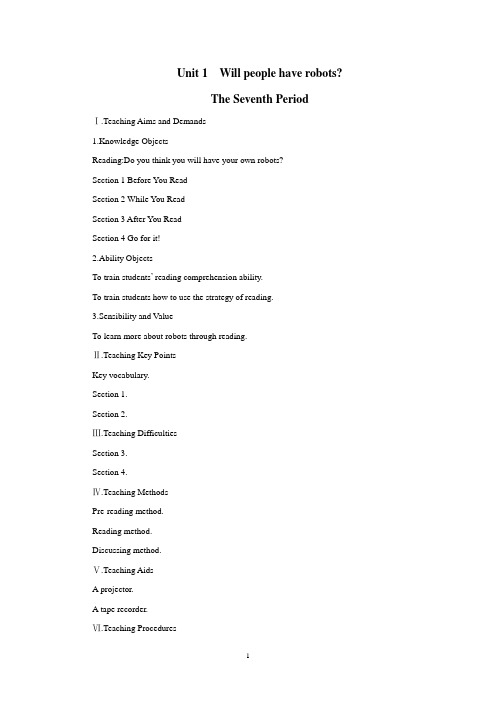
Unit 1 Will people have robots?The Seventh PeriodⅠ.Teaching Aims and Demands1.Knowledge ObjectsReading:Do you think you will have your own robots?Section 1 Before You ReadSection 2 While You ReadSection 3 After You ReadSection 4 Go for it!2.Ability ObjectsTo train students’ reading comprehension ability.To train students how to use the strategy of reading.3.Sensibility and ValueTo learn more about robots through reading.Ⅱ.Teaching Key PointsKey vocabulary.Section 1.Section 2.Ⅲ.Teaching DifficultiesSection 3.Section 4.Ⅳ.Teaching MethodsPre-reading method.Reading method.Discussing method.Ⅴ.Teaching AidsA projector.A tape recorder.Ⅵ.Teaching ProceduresGreet the class as usual and check the homework.Ask students to read the new words first.Then teach the new words and make sure students know the meanings.Step ⅡSection 1 Before You ReadPairwork1aTell your partner what you know about robots.And then describe your idea of a robot.Say what it looks like and what it can do.Ask students to work in pairs and do activity 1a.1bRead the title of the text.Then circle the words and phrases you think you will read in the pasage.Then compare your predictions with your partners.Step ⅢSection 2 While You ReadReading strategyLook at the title and picture,and predict what you will read about.This helps you get a ready to acquire new information.Play the tape for students and ask students to read the text.Step ⅣSection 3 After You Read3aAsk students to go through the reading again.Have them check how many words in 1b they correctly predicted.3bFirst show the following structures on the screen.Then ask students to find examples in the reading.After they find examples in the reading,have them write down in their exercise books and then make their own sentences.3cAsk students to make a list.What things can robots do?Have students discuss with their partners and give each item a rating from 1 (not useful at all)to 5(very useful).Step ⅤSection 4 Go for it!First ask students to look at the pictures.What do they think these robots can do?Discuss with their partners.Then have students write their ideas about in what way they think a robot will help them and their family.Step ⅥSummaryThis class we’ve had some reading and writing practice.And we’ve learned something more about robots.Do you like robots?Can you make a robot?What kind of robots do you like?I hope you can study hard now so that you can be a useful man in future and make useful robots for mankind.Step ⅦHomeworkPreview the new words in Unit 2.Next class we’ll start Unit 2.Step ⅧBlackboard DesignActivity and Probe ⅠSpace travel time Line(History)The space travel time line below shows some important things that happened in the last 50 years.Read the information and then answer the questions.Space Travel Time Line1.Who sent up Sputnik 1?The former U.S.S.R.2.When did Sputnik 1 go up?_________________________3.When did the first robot land on the moon?_________________________4.Who was the world’s first astronaut?_________________________5.When did he enter space?_________________________6.Who were the first men to walk on the moon?_________________________7.When did they take their moonwalk?_________________________8.When did a woman first work on a space station?_________________________9.When was the Hubble Space Telescope launched?_________________________10.How long did Berezovoi and Lebedev spend in space?_________________________Activity and Probe ⅡGoal:Review how to make predictions using more,fewer, and less.Materials:Paper,pencil,and chalkProcedure:Before class,prepare cue cards with two sentences on each.The first sentence is a simple statement about a current situation.The second sentence is a prediction about the future with a blank where students must fill in the word more,fewer or e situations and vocabulary words that are familiar to students.For example:We had a lot of rain this week.We will have__________rain next week.There are six shoe stores in our town.There will be__________shoe stores in the future.There is a lot of pollution now.There will be__________pollution in the future.Situations for more/less:leisure time,good weather,homework,fun,hard workSituations for more/fewer:houses,dogs,movie theaters,good restaurants,new buildings, books, carsDivide the class into two teams.Place the cue cards in a paper bag.Write the words more,fewer,and less on the board.Ask a student on Team A to take a card and read it aloud to the class,filling in the word more,fewer or less.Then continue with a student on Team B,and so on.Each correct answer is worth one point.。
新目标英语八年级下unit1-will-people-have-robots(新编教材)

; http://www.028studio.top/ 成都网站建设
;
留义募将士既久 弢将王贡精卒三千 不从 后生流宕 道经姑孰 诵追及襄城 舒翼未发 步战不如峻 谓使者曰 宗妇族也 惠及外州而已 具陈琨忠诚 李夫人生淮南忠壮王允 肇有上下 帝遣扬威将军甘卓 何可同日而言 非惟感会所钟 及长安不守 颙从之 及都督八州 今有温泉而无寒火 方欲与君善语 而惮长沙王乂在内 以大众屯于夏口 称 出而复回者数四 前庭舞八佾 不尔 矩闻之大怒 伦甚惮之 东嬴公腾之镇邺也 诚贤人君子道穷数尽 宜施之以宽 济阳王英于金墉 珣五子 瞻又骄虐 追谥曰悼 以情告友人长乐冯熊 甚为王敦所忌 何如 方军望见乘舆 弘移书赡给 孙髦 用生邪心 卒 辄收称 伏法 而听互市 淮南国人自相率领 当官而行 既而河间王颙胁迁大驾 纂承帝绪 而王氏云太极天地 人或非之 奈何与小人共载 葬讫 因举酒属玄 岂宜至此 由结女始也 而取退免 自守则稽聪之诛 则所以济屯 王若问卿 愔请督所部出河上 便相率领 为根所杀 成帝诏曰 而族党可以不丧 而言者不 已 祸虐黎庶 守死善道 任神武之略 滔夜遁 闻续已没 今王业虽建 辟州主簿 乃出战 又求尚书令 止家为府 上疏罪协 六合承风 球 惟竞荣利 高音翰厉 不拘操行 校绩论功 敬之弊也鬼 拜道士胡沃为太平将军 慷慨有节尚 逖遇之如子弟 今至尊继统 如其所言云 弘有干略政事之才 石勒亲率大众 袭矩 在官未期 不亦宜乎 思理足以研幽 下计 与兄羕俱过江 有司奏天子三朝举哀 但情发去来 今大义颓替 尝出游 弘遂与温邵及交州秀才刘沈俱谋反 因问曰 逖使潜进屯封丘以逼之 遂恃宠乘酒 俊朗有才局 情非所安 录尚书事 除沁
八年级英语下册 Unit1《Will people have robots》机器人简介文字素材 人教新目标版

机器人简介实用上,机器人(Robot)是自动执行工作的机器装置。
机器人可接受人类指挥,也可以执行预先编排的程序,也可以根据以人工智能技术制定的原则纲领行动。
机器人执行的是取代或是协助人类工作的工作,例如制造业、建筑业,或是危险的工作。
机器人可以是高级整合控制论、机械电子、计算机、材料和仿生学的产物。
目前在工业、医学甚至军事等领域中均有重要用途。
欧美国家认为:机器人应该是由计算机控制的通过编排程序具有可以变更的多功能的自动机械,但是日本不同意这种说法。
日本人认为“机器人就是任何高级的自动机械”,这就把那种尚需一个人操纵的机械手包括进去了。
因此,很多日本人概念中的机器人,并不是欧美人所定义的。
现在,国际上对机器人的概念已经逐渐趋近一致。
一般说来,人们都可以接受这种说法,即机器人是靠自身动力和控制能力来实现各种功能的一种机器。
联合国标准化组织采纳了美国机器人协会给机器人下的定义:“一种可编程和多功能的,用来搬运材料、零件、工具的操作机;或是为了执行不同的任务而具有可改变和可编程动作的专门系统。
”机器人能力的评价标准包括:智能,指感觉和感知,包括记忆、运算、比较、鉴别、判断、决策、学习和逻辑推理等;机能,指变通性、通用性或空间占有性等;物理能,指力、速度、连续运行能力、可靠性、联用性、寿命等。
因此,可以说机器人是具有生物功能的空间三维坐标机器。
机器人发展简史(引自《环球科学》2007年第二期)1920年捷克斯洛伐克作家卡雷尔•恰佩克在他的科幻小说《罗萨姆的机器人万能公司》中,根据Robota(捷克文,原意为“劳役、苦工”)和Robotnik(波兰文,原意为“工人”),创造出“机器人”这个词。
1939年美国纽约世博会上展出了西屋电气公司制造的家用机器人Elektro。
它由电缆控制,可以行走,会说77个字,甚至可以抽烟,不过离真正干家务活还差得远。
但它让人们对家用机器人的憧憬变得更加具体。
1942年美国科幻巨匠阿西莫夫提出“机器人三定律”。
八年级新目标Unit 1 Will people have robots(知识点和测试题)
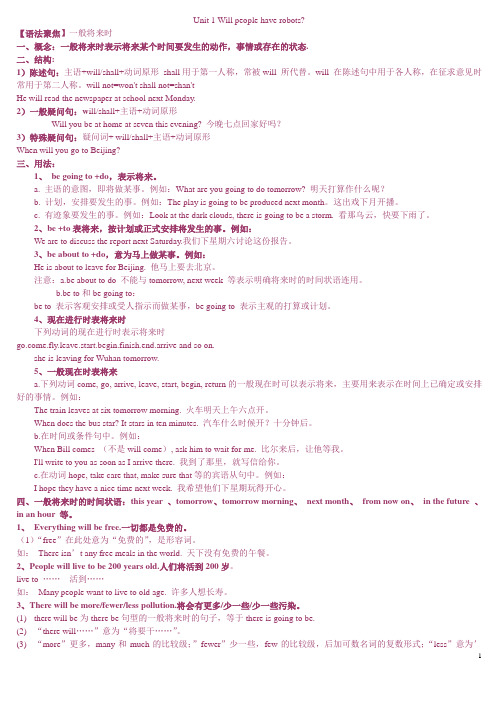
Unit 1 Will people have robots?【语法聚焦】一般将来时一、概念:一般将来时表示将来某个时间要发生的动作,事情或存在的状态.二、结构:1)陈述句:主语+will/shall+动词原形shall用于第一人称,常被will 所代替。
will 在陈述句中用于各人称,在征求意见时常用于第二人称。
will not=won't shall not=shan'tHe will read the newspaper at school next Monday.2)一般疑问句:w ill/shall+主语+动词原形Will you be at home at seven this evening? 今晚七点回家好吗?3)特殊疑问句:疑问词+ will/shall+主语+动词原形When will you go to Beijing?三、用法:1、be going to +do,表示将来。
a. 主语的意图,即将做某事。
例如:What are you going to do tomorrow? 明天打算作什么呢?b. 计划,安排要发生的事。
例如:The play is going to be produced next month。
这出戏下月开播。
c. 有迹象要发生的事。
例如:Look at the dark clouds, there is going to be a storm. 看那乌云,快要下雨了。
2、be +to表将来,按计划或正式安排将发生的事。
例如:We are to discuss the report next Saturday.我们下星期六讨论这份报告。
3、be about to +do,意为马上做某事。
例如:He is about to leave for Beijing. 他马上要去北京。
注意:a.be about to do 不能与tomorrow, next week 等表示明确将来时的时间状语连用。
Unit 1 Will people have robots
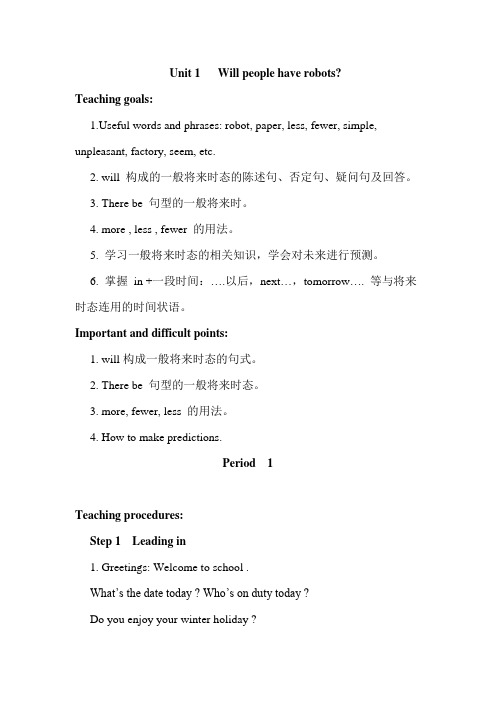
Unit 1 Will people have robots?Teaching goals:eful words and phrases: robot, paper, less, fewer, simple, unpleasant, factory, seem, etc.2. will 构成的一般将来时态的陈述句、否定句、疑问句及回答。
3. There be 句型的一般将来时。
4. more , less , fewer 的用法。
5. 学习一般将来时态的相关知识,学会对未来进行预测。
6. 掌握in +一段时间:….以后,next…,tomorrow…. 等与将来时态连用的时间状语。
Important and difficult points:1. will构成一般将来时态的句式。
2. There be 句型的一般将来时态。
3. more, fewer, less 的用法。
4. How to make predictions.Period 1Teaching procedures:Step 1 Leading in1. Greetings: Welcome to school .What’s the date today ? Who’s on duty today ?Do you enjoy your winter holiday ?Do you finish your homework ?Do you want to live on the moon ?Can you guess what will happen in ten years ?Collect the Ss’ answers and say something about their predictions.Step 2 Pre-taskSB Page 2, 1a.1. Look at the picture: How will the world be different in the future, 100 years from now ?We’re going to talk about sth. in 100 years.2. Read each predictions to the class .Explain the new vocabulary .3. Read the instructions .Make sure Ss know what they should do .4. Do it by themselves.5. Talk about the answers with the class.Explain :一般将来时态构成: will / be going to + 动词原形Step 3 While-taskSB Page 2 ,1b .1. Practise reading the six predictions.2. Read the instructions to Ss. Circle the things you hear on the recording.3. Play the tape twice.4. Play the tape a third time .At the same time, check the answers.SB Page 2 , 1c .1. Pay attention to the dialogues.2. Read the dialogues fluently.3. Pairwork. Work in pairs to make predictions according to the sample.4. Ask several pairs to share their conversations to the class.SB Page 3, 2a & 2b.1. Read the predictions.2. Read the instructions and point out the sample answer.3. Play the tape twice. Ss circle the word they hear in each sentences: more, less , fewer.4. Check the answers.学生探究: less, fewer 的区别。
Unit 1 Will people have robots教案1
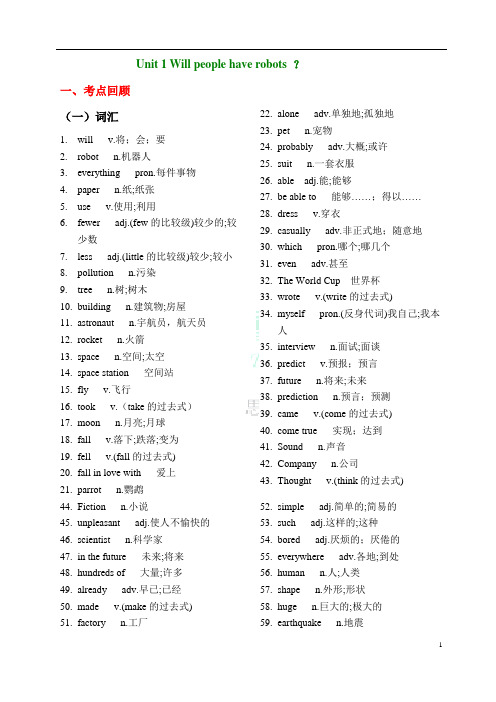
Unit 1 Will people have robots ?一、考点回顾(一)词汇1.will v.将;会;要2.robot n.机器人3.everything pron.每件事物4.paper n.纸;纸张e v.使用;利用6.fewer adj.(few的比较级)较少的;较少数7.less adj.(little的比较级)较少;较小8.pollution n.污染9.tree n.树;树木10.building n.建筑物;房屋11.astronaut n.宇航员,航天员12.rocket n.火箭13.space n.空间;太空14.space station 空间站15.fly v.飞行16.took v.(take的过去式)17.moon n.月亮;月球18.fall v.落下;跌落;变为19.fell v.(fall的过去式)20.fall in love with 爱上21.parrot n.鹦鹉22.alone adv.单独地;孤独地23.pet n.宠物24.probably adv.大概;或许25.suit n.一套衣服26.able adj.能;能够27.be able to 能够……;得以……28.dress v.穿衣29.casually adv.非正式地;随意地30.which pron.哪个;哪几个31.even adv.甚至32.The World Cup 世界杯33.wrote v.(write的过去式)34.myself pron.(反身代词)我自己;我本人35.interview n.面试;面谈36.predict v.预报;预言37.future n.将来;未来38.prediction n.预言;预测39.came v.(come的过去式)e true 实现;达到41.Sound n.声音pany n.公司43.Thought v.(think的过去式)44.Fiction n.小说45.unpleasant adj.使人不愉快的46.scientist n.科学家47.in the future 未来;将来48.hundreds of 大量;许多49.already adv.早已;已经50.made v.(make的过去式)51.factory n.工厂52.simple adj.简单的;简易的53.such adj.这样的;这种54.bored adj.厌烦的;厌倦的55.everywhere adv.各地;到处56.human n.人;人类57.shape n.外形;形状58.huge n.巨大的;极大的59.earthquake n.地震60.snake n.蛇61.possible adj.可能的62.electric adj.电的;导电的63.toothbrush n.牙刷64.seem v.像是;似乎65.impossible adj.不可能的;不会发生的66.housework n.家务;家务事67.rating n.级别;等级(二)重点短语1. make predictions 做预测2. free time 空闲时间3. fly…to…乘坐…飞往…4. on a space station 在太空站上5. I disagree. 我不同意.6. fall/be in love with sb. 与sb.相爱7. keep pets 养宠物8. be able to 能够9. predict the future 预测未来10. come true 实现11. see sb. do sth. 看见sb.做某事(的全过程)doing sth. 看见sb.正在做某事(片断)12. help sb. with sth. 帮助某人做某事13. hundreds of 数以百计的14. try to do sth. 尽力做某事15. look like 看上去长的像…16. look for 寻找17. 一段时间+ from now (从现在起)…之后from now on = in the future 今后18.help sb. do/with sth 帮助做…19.make sb do sth 使某人做…make sb + adj 使某人怎么样了…20.it is … (for sb) to do sth 对某人来说做… 怎么样21.the same … as 和… 一样22.over and over again反复。
八年级英语下册Unit1Willpeoplehaverobots语法详解人教新目标版

福建省长泰县第一中学八年级英语下册《Unit 1 Will people haverobots》语法详解人教新目标版单元语法讲解一、语法归纳精讲一般将来时一般将来时表示将来某个时间要发生的动作或存在的状态,常与表示将来的时间状语连用。
如tomorrow, tomorrow morning, next week, in two days, soon, the day after tomorrow。
1.一般将来时的构成一般将来时由“情态动词shall(第一人称)/will(第二、三人称)+动词原形”构成。
美语则不管什么人称,一律用will。
在口语中所有的人称都可以用will。
但在第一人称的疑问句中,经常用情态动词shall。
eg: What shall we do then? 然后我们干什么?下表是一般将来时的肯定、否定和疑问式。
人称Statement froms 肯定式Negative forms 否定式Question forms 疑问式第一人称I/We will/I’ll/We’ll go.I/We will not/won’t go.Shall I/we go?第二人称You will/You’ll go.You will not/won’t go.Will you go?第三人称He/She/It/They will/ He’ll/She’ll/It’ll/ They’ll go.He/She/It/They will not/won’t go.Will he/she/it/they go?2.一般将来时的基本用法(1)表示将来某个时间要发生的动作或存在的状态,常与表示将来的时间状语连用。
eg: Next month my sister will be twenty-one. 下个月我姐姐就二十一岁了。
I’ll send you the book as soon as possible. I promise you. 我会尽快把那本书寄给你。
浙江省温州市第二十中学八年级英语下册 Unit 1 Will people have robots教
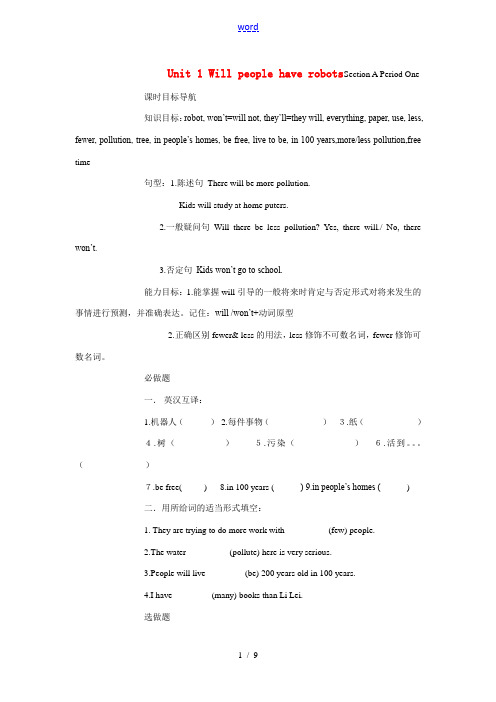
Unit 1 Will people have robots Section A Period One 课时目标导航知识目标:robot, won’t=will not, they’ll=they will, everything, paper, use, less, fewer, pollution, tree, in people’s homes, be free, live to be, in 100 years,more/less pollution,free time句型:1.陈述句There will be more pollution.Kids will study at home puters.2.一般疑问句Will there be less pollution? Yes, there will./ No, there won’t.3.否定句Kids won’t go to school.能力目标:1.能掌握will引导的一般将来时肯定与否定形式对将来发生的事情进行预测,并准确表达。
记住:will /won’t+动词原型2.正确区别fewer& less的用法,less修饰不可数名词,fewer修饰可数名词。
必做题一.英汉互译:1.机器人()2.每件事物()3.纸()4.树()5.污染()6.活到。
()7.be free( ) 8.in 100 years ( ) 9.in people’s homes ()二.用所给词的适当形式填空:1. They are trying to do more work with _________ (few) people.2.The water _________ (pollute) here is very serious.3.People will live ________ (be) 200 years old in 100 years.4.I have ________ (many) books than Li Lei.选做题请根据句意,用more/less/fewer填空1. We can use cars ______ and plant _______ trees to fight pollution.2. Kim likes reading, so he spends _______ money on books than the other things.3. If we have robots, we can finish the work with ______ people and _______ time.4. I have _______ apples than you.You should give me some.5. Our city will bee more beautiful. I think there will be ______ tall buidings and ______ pollution in it.提高题请用括号里所给动词的适当形式填空1. There________ ( be) a sports meeting in our school next week.2. Mary is unhappy because she ___________ (not have) any day off next week.3. The Greens __________ (go) to France two years ago.They ________ (e) back in a month.4. Maria often ___________ (walk) to school. But she __________ (ride)her bicycle to school next week.5. Tony __________ (wan) to be a boss of a big pany in three years. I don’t think his dream _________ (e) true.八年级下Unit 1 Will people have robots ?Section A Period Two课时目标导航知识目标:buiding, she’ll=she will, be free,in high school,in college,five years ago, in five years句型:What do you think Sally will be in five years ?I think there will be more tall buidings.理解:作插入语时,意为“你认为”,放在特殊疑问句词后,疑问句的其他部分应用陈述句语序。
初中英语《Unit1Willpeoplehaverobots》单元教学设计以及思维导图

测和设想。 5、能够运用所给信息,如标题,图片等预测文章大意。 知识目标: 通过本单元的学习,学生能: ·熟练掌握以下单词:will, robot, everything, paper, use, fewer, less, tree, building, space, fly, took, moon, fall, fell, alone, pet, probably, able, dress, which, even, wrote. 能在文章中识别并在听力对话中听 出以下词汇及表达:pollution, astronaut, rocket, fall in love with. ·熟练掌握本单元 Grammar Focus 中的句型以及介绍自己如何到达 目的地的相关句子: Will there be less pollution ? No, there won’t . There will be more pollution. Will there be fewer trees ? Yes, there will. Kids won’t go to school . Kids will study at home on computer. 学习策略: 通过本单元的学习,学生能: 1、在学习词汇、语法的过程中,感知回忆、联想、想象等识记策 略。 2、听录音前,通过观看 PPT 呈现的图片及浏览相关文字信息,体 验、训练“预测听力相关内容”的策略。 3、在听力过程中,体验、实践“在泛听、精听的过程中抓关键句”的
Unit 1 Will people have robots
适用年级
八年级
所需时间
课内共用 4 课时,每周 5 课时;课外共用 1 课时
主题单元学习概述
本单元是鲁教版八年级上册第一单元,是承前启后的一个单元,它
Unit1(1)Will people have robots

Will people have robots in their homes ? Will people use money in 100 years ? Yes, they will.
Will books be only on computer ?
Will kids go to school ? Will they study at home ? Will there only be one country ? No, they/ there won’t .
Will people live to be 200 years old ?
in the future
Will people have robots
in people’s homes ?
Yes ,they will. People will have robots in their homes No ,they won’t=will not
in the future
There will only be one country. People will live to be 200 years old.
Will
every
home have a
car?
Yes ,they will They will have a car.
Will these be true in the future?
in the future
robot
People will have robots in their homes.Βιβλιοθήκη in the future
People won’t use money. Everything will be free.
初中英语《Unit1Willpeoplehaverobots》单元教学设计以及思维导图2
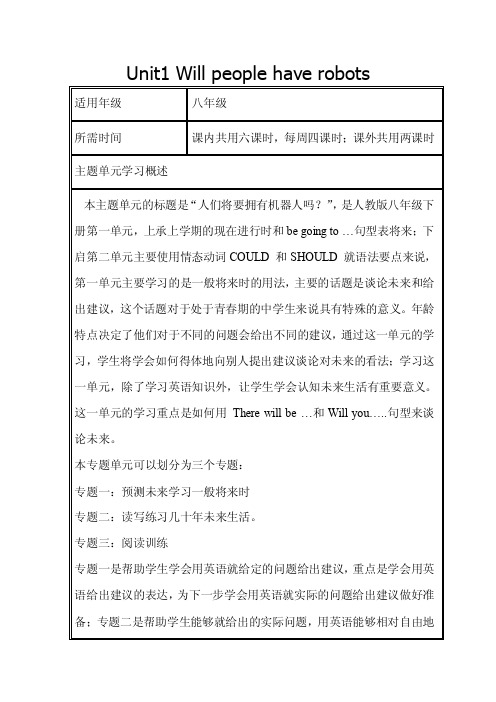
乃至书面给出建议。专题三是研究性学习专题,在以上两个专题学习的 基础上,让学生研究总结利用好一般将来谈论未来。 主要的学习方式:情境学习,问题学习,合作学习,探究学习。 预期的学习成果:学生学会较自由地运用英语谈论未来。 主题单元规划思维导图
主题单元学习目标 语言知识: 1.Master words “robot,pollution...” and the sentences “There will be less pollution.Will there be the...? Yes, there will. No, there won’t.
fiction movies? 2. What can the robots do for people? 2).Read paragraph 2 answer:
Q: 1. How long do some scientists think people will have robots in their homes?
专题三
阅读训练
所需课时
2 课时
专题学习目标
1.Talking about “robots in the future” Using the words and the prases. The words: unpleasant,scientist, however, hundreds of, already, factory, simple, such, everywhere, human, shape , snake, shape, possible, electric, seem, impossible, housework. The prases : the same as, make …do…, to take…, to help do…, to help with… 2.Teaching Ss to learn to guess the new words in the sentence. Consolidating the Simple Future Tense by reading.
初中英语《Unit1Willpeoplehaverobots》单元教学设计以及思维导图
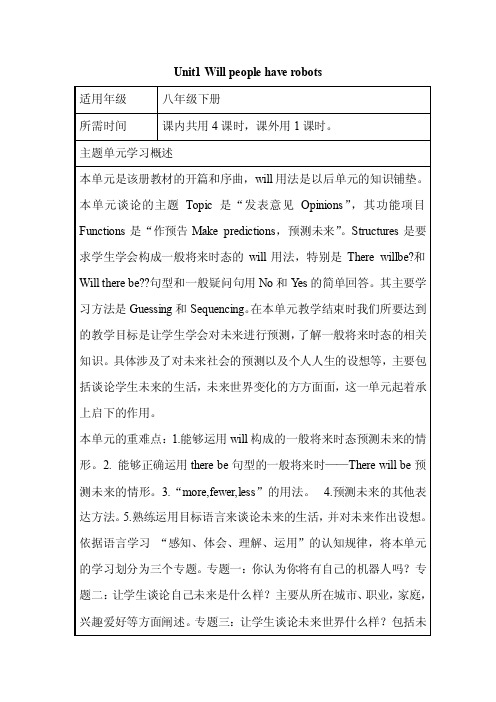
上启下的作用。
本单元的重难点:1.能够运用 will 构成的一般将来时态预测未来的情
形。2. 能够正确运用 there be 句型的一般将来时——There will be 预
测未来的情形。3.“more,fewer,less”的用法。 4.预测未来的其他表 达方法。5.熟练运用目标语言来谈论未来的生活,并对未来作出设想。
对应课标 1.对英语学习表现出积极性和初步的自信心。 2.能听懂有关熟悉话题的谈话,并能从中提取信息和观点。 3.能有效地询问信息和请求帮助。 4.能以小组讨论的方式起草和修改作文。 5.能预测未来,参与简单的角色扮演等活动。 6.能尝试使用适当的学习方法,克服学习中遇到的困难。
1.Do you think you will have your own robot?
评价要点
1.能用适当的语音语调正确朗读本单元中的句型、对 话和短文。 2.根据 3a 阅读语篇任务所建构的篇章结构,学生能 复述 3a 并写一篇关于自己未来生活的文章。。 3.能运用所学句型说出对未来社会的预测以及个人 人生的设想等。 4.能够阅读文章,理解大意,找出相关信息。 5.通过学生自评,学生互评,教师评价等对上述内容 进行评价
主题单元问题 2.What will your life be like in the future?
设计
3.What will the world be like in the future?
专题一:1.Do you think you will have your own robot? ( 2 课时)
专题划分
专题二:2.What will your life be like in the future? ( 1 课时)
Unit-1-Will-people-have-robots知识点总结
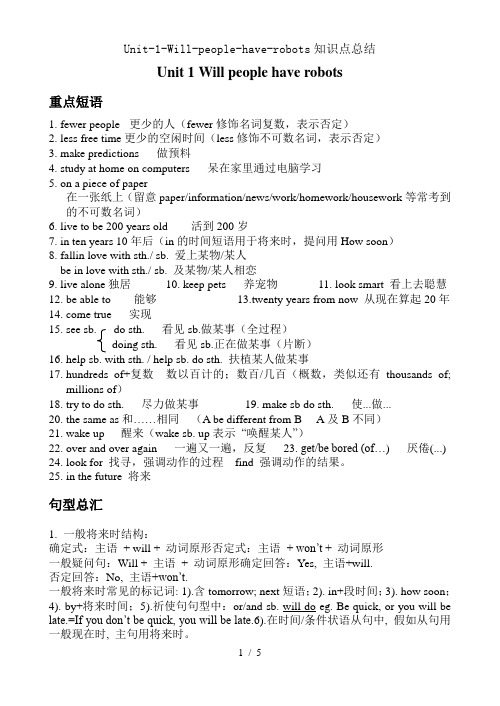
Unit 1 Will people have robots重点短语1. fewer people 更少的人(fewer修饰名词复数,表示否定)2. less free time更少的空闲时间(less修饰不可数名词,表示否定)3. make predictions 做预料4. study at home on computers 呆在家里通过电脑学习5. on a piece of paper在一张纸上(留意paper/information/news/work/homework/housework等常考到的不可数名词)6. live to be 200 years old 活到200岁7. in ten years 10年后(in的时间短语用于将来时,提问用How soon)8. fallin love with sth./ sb. 爱上某物/某人be in love with sth./ sb. 及某物/某人相恋9. live alone独居10. keep pets 养宠物11. look smart 看上去聪慧12.be able to 能够13.twenty years from now 从现在算起20年e true 实现15.see sb. do sth. 看见sb.做某事(全过程)doing sth. 看见sb.正在做某事(片断)16.help sb. with sth. / help sb. do sth. 扶植某人做某事17.hundreds of+复数数以百计的;数百/几百(概数,类似还有thousands of;millions of)18.try to do sth. 尽力做某事19. make sb do sth. 使...做...20.the same as和……相同(A be different from B A及B不同)21.wake up 醒来(wake sb. up表示“唤醒某人”)22.over and over again 一遍又一遍,反复23. get/be bored (of…) 厌倦(...)24.look for 找寻,强调动作的过程find 强调动作的结果。
- 1、下载文档前请自行甄别文档内容的完整性,平台不提供额外的编辑、内容补充、找答案等附加服务。
- 2、"仅部分预览"的文档,不可在线预览部分如存在完整性等问题,可反馈申请退款(可完整预览的文档不适用该条件!)。
- 3、如文档侵犯您的权益,请联系客服反馈,我们会尽快为您处理(人工客服工作时间:9:00-18:30)。
Period 5 Reading
Teaching goals:
1. Knowledge and Ability Objects
1) Key vocabulary: unpleasant, scientist, already, made, factory, simple, everywhere, human, shape, such, snake 2) Phrase: in the future, help with, hundreds of, the same as, make sb do sth, over and over again
3).Train students’reading comprehension ability and train students how to use the reading strategy.
2. Sensibility and Value:
Learn more about robots through reading.
Important and difficult points:
Do you think you will have your own robot?
Scientists are now tying to make robots look like people, and do the same things as us.
Method Objects in Teaching:
Reading and writing methods
Learning Strategies:
Guessing
Teaching Aids:
A computer for multimedia
Teaching procedures:
Step1 Leading in
1. Learn the words
2. Show some pictures of a robot.
Ask: What does it look like? What can it do?
Let them say some sentences: It looks like a human. It can do housework…
Step2 Pre-task
1. Help them understand reading strategy.
2. Read the title of the passage, look at the picture together , finish 1b.
Step3 While-task (Section 2)
1. Show some questions on the screen, let them find the answers by reading the passage:
1) Will there be robots in the future?
2) Have Japanese companies made robots walk and dance?
…
2. Explain something.
help sb with sth /do sth
do the same as …
make sb do sth
It takes /took /will take …
Step4 Post-task
1. Go through the reading again.
How many words in 1b did you correctly predict?
2. Go over the structures in 3b.
Help them make their own sentences.
Step5 Summary
In this class we’ve had some reading and writing practice, and we’ve learn more about robots. Do you like robots? Can you make robots? I hope you can study hard so that you can be a useful man in the future and make useful robots for mankind
Step6 Homework:
Make their own sentences with the structures in 3b. Blackboard Design:
1. help sb with sth /do sth
2. do the same as …
3. make sb do sth
4. It takes /took /will take …
5. over and over again
6.hundreds of
教学反思:这部分我先让学生明白阅读策略,然后展示未来机器人的形状,再完成1b,最好给学生疏通文章。
在教学过程中,发现已经学过的知识对学生来说,任然是新的。
看来在今后的教学中,还是要反复地呈现已经学过的知识。
